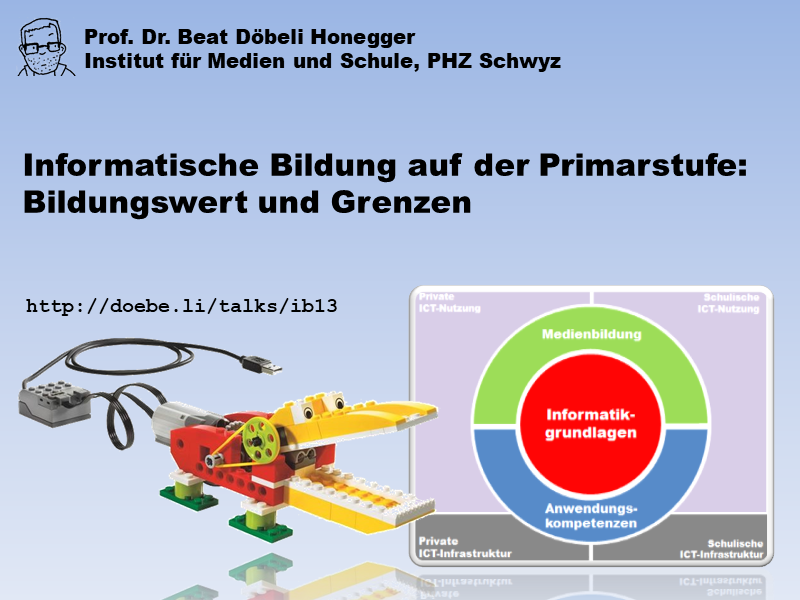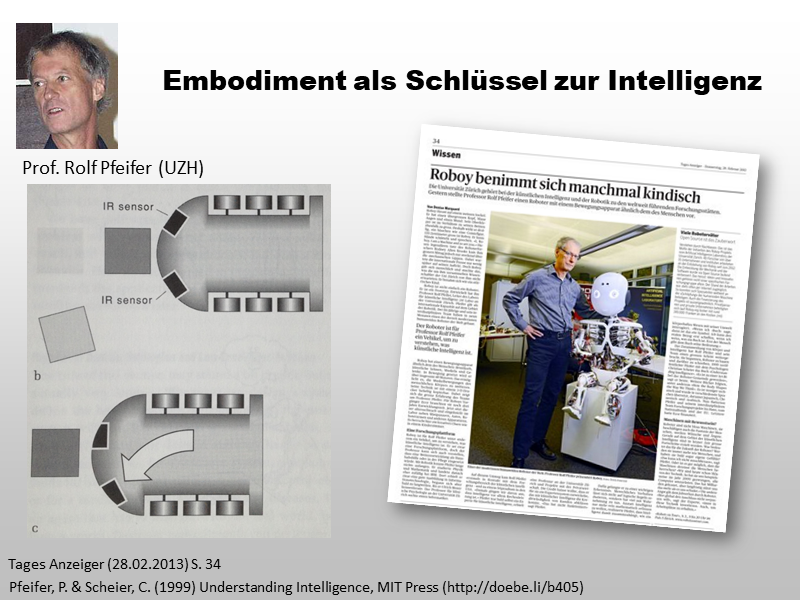Understanding Intelligence |

|
 Diese Seite wurde seit 1 Jahr inhaltlich nicht mehr aktualisiert.
Unter Umständen ist sie nicht mehr aktuell.
Diese Seite wurde seit 1 Jahr inhaltlich nicht mehr aktualisiert.
Unter Umständen ist sie nicht mehr aktuell.
 Zusammenfassungen
Zusammenfassungen
 Evolutionary theory says that the brain has evolved not to do mathematical proofs but to control behaviour and ensure survival. Researchers agree that intelligence always manifests itself in behaviour - thus it is behaviour that must be understood. A new field has grown around the study of behaviour-based intelligence, also known as embodied cognitive science, "new AI" and "behaviour-based AI". This book provides a systematic introduction to this new way of thinking. After discussing concepts and approaches such as subsumption architecture, Braitenberg vehicles, evolutionary robotics, artificial life, self-organization and learning, the authors derive a set of principles and a framework for the study of naturally and artificially intelligent systems, or autonomous agents. This framework is based on a synthetic methodology whose goal is understanding by designing and building. The text includes the background material required to understand the principles underlying intelligence, as well as information of intelligent robotics and simulated agents so readers can begin experiments and projects on their own. The reader is guided through a series of case studies that illustrate the design principles of embodied cognitive science.
Evolutionary theory says that the brain has evolved not to do mathematical proofs but to control behaviour and ensure survival. Researchers agree that intelligence always manifests itself in behaviour - thus it is behaviour that must be understood. A new field has grown around the study of behaviour-based intelligence, also known as embodied cognitive science, "new AI" and "behaviour-based AI". This book provides a systematic introduction to this new way of thinking. After discussing concepts and approaches such as subsumption architecture, Braitenberg vehicles, evolutionary robotics, artificial life, self-organization and learning, the authors derive a set of principles and a framework for the study of naturally and artificially intelligent systems, or autonomous agents. This framework is based on a synthetic methodology whose goal is understanding by designing and building. The text includes the background material required to understand the principles underlying intelligence, as well as information of intelligent robotics and simulated agents so readers can begin experiments and projects on their own. The reader is guided through a series of case studies that illustrate the design principles of embodied cognitive science. Bemerkungen zu diesem Buch
Bemerkungen zu diesem Buch
 Kapitel
Kapitel 
- 1. The Study of Intelligence
- 2. Foundations of Classical Artificial Intelligence and Cognitive Science
- 3. The Fundamental Problems of Classical AI and Cognitive Science

- 4. Embodied Cognitive Science - Basic Concepts

- 5. Neural Networks for Adaptive Behaviour
- 6. Braitenberg Vehicles
- 8. Artificial Evolution and Artificial Life

- 10. Design Principles of Autonomous Agents

 Dieses Buch erwähnt ...
Dieses Buch erwähnt ...
 Dieses Buch erwähnt vermutlich nicht ...
Dieses Buch erwähnt vermutlich nicht ... 
 Nicht erwähnte Begriffe | Autopoiese, Berechenbarkeit, Bildung, Chat-GPT, Chemie, Deklaratives/explizites Gedächtnis, Digitalisierung, Eltern, Epistemologie (Erkenntnistheorie), Explizites Wissen, Farbwahrnehmung, Generative Machine-Learning-Systeme (GMLS), Konstruktivismus, LehrerIn, Nervensystem, Perturbation, Schule, Sprachenlernen, Ultra-Kurzzeitgedächtnis, Unterricht, Virtualität, Wissensmanagement, Zellmembran |
 Tagcloud
Tagcloud
 Vorträge von Beat mit Bezug
Vorträge von Beat mit Bezug
 Einträge in Beats Blog
Einträge in Beats Blog
 Zitationsgraph
Zitationsgraph
 Zitationsgraph (Beta-Test mit vis.js)
Zitationsgraph (Beta-Test mit vis.js)
 Zeitleiste
Zeitleiste
 8 Erwähnungen
8 Erwähnungen 
- Digitale Lernwelten - Veranstaltung des GDI am 29.September 1999 (1999)


- Lernen von und mit Robotern - oder: Nicht alles ist digital! Erkenntnisse aus der AI-Forschung (Rolf Pfeifer)


- Lernen von und mit Robotern - oder: Nicht alles ist digital! Erkenntnisse aus der AI-Forschung (Rolf Pfeifer)
- Sciences of the Interface - Proceedings of the International Symposium (Hans Diebner, Timothy Druckrey, Peter Weibel) (2001)

- The Interface Problem in Cognitive Psychology (Wolfgang Tschacher)
- Wozu Systeme? (Dirk Baecker) (2002)


- How the Body Shapes the Way We Think - A New View of Intelligence (Rolf Pfeifer, Josh Bongard) (2006)

- From Bricks to Brains - The Embodied Cognitive Science of LEGO Robots (Michael Dawson, Brian Dupuis, Michael Wilson) (2010)

- Werkspuren 1/2012 - Robotik (2012)

- Künstliche Intelligenz - Von der ersten Rechenmaschine zum Androiden (Thomas Emmenegger)

- Kleine Maschinen ganz gross - Konkrete Bauvorschläge für Agenten (Thomas Emmenegger)

- Künstliche Intelligenz - Von der ersten Rechenmaschine zum Androiden (Thomas Emmenegger)
- EmbedIT - an Open Robotic Kit for Education (Dorit Assaf) (2013)


 Co-zitierte Bücher
Co-zitierte Bücher

Der mittlere Weg der Erkenntnis
Der Brückenschlag zwischen wissenschaftlicher Theorie und menschlicher Erfahrung
The Embodied Mind
(Francisco J. Varela, Evan Thompson, Eleanor Rosch) (1991)


Understanding Computers and Cognition
A New Foundation for Design
(Terry Winograd, Fernando Flores) (1987)


Das Erwachen der Intelligenz beim Kinde
La naissance de l'intelligence chez l'enfant
(Jean Piaget) (1936)

 Volltext dieses Dokuments
Volltext dieses Dokuments
 | Understanding Intelligence: Gesamtes Buch als Volltext ( : 5801 kByte) : 5801 kByte) |
 | Understanding Intelligence: Gesamtes Buch als Volltext ( : :  , 9301 kByte) , 9301 kByte) |
 | Artificial Evolution and Artificial Life: Kapitel als Volltext ohne Abbildungen und Tabellen ( : :  , 181 kByte) , 181 kByte) |
 | Design Principles of Autonomous Agents: Kapitel als Volltext ohne Abbildungen und Tabellen ( : :  , 132 kByte) , 132 kByte) |
 | Embodied Cognitive Science: Kapitel als Volltext ohne Abbildungen und Tabellen ( : :  , 191 kByte) , 191 kByte) |
 | The Fundamental Problems of Classical AI and Cognitive Science: Kapitel als Volltext ohne Abbildungen und Tabellen ( : :  , 112 kByte) , 112 kByte) |
 Standorte
Standorte 
 Bibliographisches
Bibliographisches 
| Titel | Format | Bez. | Aufl. | Jahr | ISBN | ||||||
| Understanding Intelligence | E | Gebunden | - | 1 | 1999 | 0262161818 |  |
 |
 |
 |
|
| Understanding Intelligence | E | Paperback | - | 1 | 2001 | 026266125X |  |
 |
 |
 |
 |
 Beat und dieses Buch
Beat und dieses Buch
Beat hat dieses Buch während seiner Assistenzzeit an der ETH Zürich ins Biblionetz aufgenommen. Die bisher letzte Bearbeitung erfolgte während seiner Zeit am Institut für Medien und Schule. Beat besitzt ein physisches und ein digitales Exemplar. (das er aber aus Urheberrechtsgründen nicht einfach weitergeben darf). Aufgrund der vielen Verknüpfungen im Biblionetz scheint er sich intensiver damit befasst zu haben. Beat hat dieses Buch auch schon in Vorträgen sowie in Blogpostings erwähnt.









 Algorithmus
Algorithmus Biologie
Biologie Denken
Denken Emotionen
Emotionen Evolution
Evolution Gehirn
Gehirn Hardware
Hardware Intelligenz
Intelligenz Kinder
Kinder Kommunikation
Kommunikation Kreativität
Kreativität Künstliche Intelligenz (KI / AI)
Künstliche Intelligenz (KI / AI) Künstliches Leben (Artificial life)
Künstliches Leben (Artificial life) Leben
Leben Lernen
Lernen machine learning
machine learning Modelle
Modelle Motivation
Motivation Neuron
Neuron Neuronales Netz
Neuronales Netz Perceptron
Perceptron Philosophie
Philosophie Problem
Problem Psychologie
Psychologie Retina
Retina Roboter
Roboter Sprache
Sprache Vergessen
Vergessen Virtual Reality
Virtual Reality Wahrnehmung
Wahrnehmung Wissen
Wissen Zelle
Zelle (
(









 Biblionetz-History
Biblionetz-History